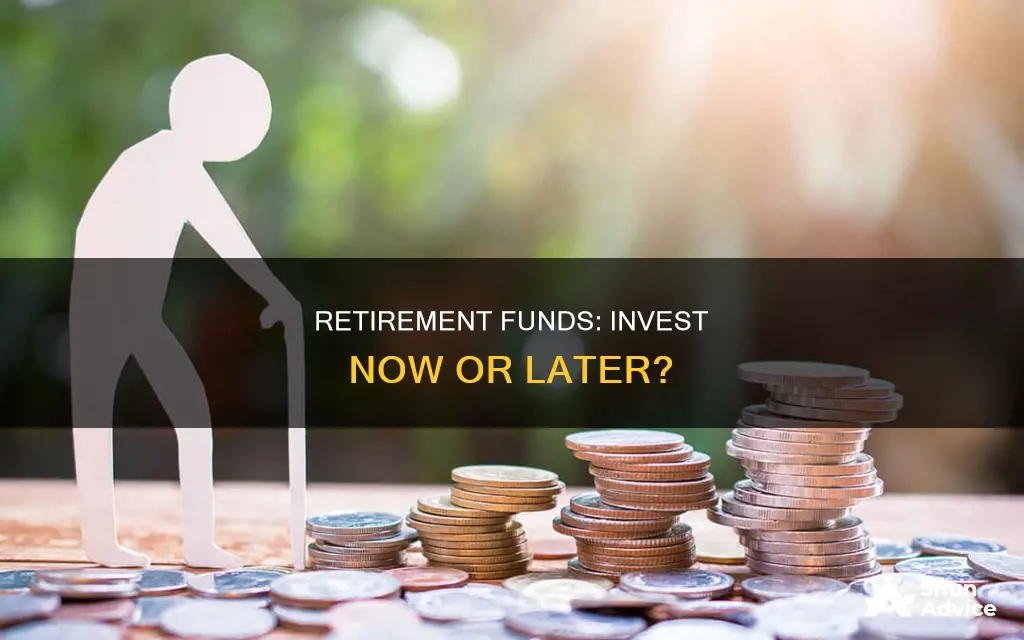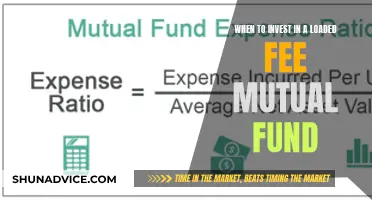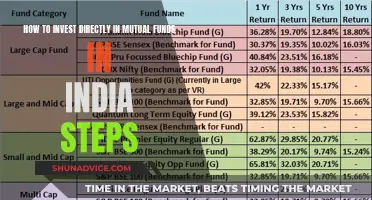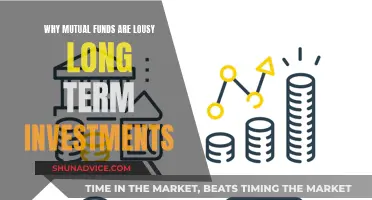
Target-date funds are a popular choice for investors saving for retirement. They are designed to reduce the complexity of investing by automatically rebalancing a portfolio of stocks, bonds, and money market accounts to reduce risk as the investor ages. The appeal of target-date funds lies in their simplicity, as they allow investors to adopt a set it and forget it approach to retirement savings. However, critics argue that target-date funds are too conservative and may charge high fees, leading to suboptimal returns for long-term investors. So, should you invest in target-date funds now? The answer depends on your financial goals, risk tolerance, and investment horizon. While target-date funds offer a convenient and hands-off approach to retirement savings, it's essential to carefully consider their advantages and disadvantages before deciding whether they align with your investment strategy and retirement goals.
What You'll Learn

Target-date funds are a set it and forget it option
Target-date funds are a "set it and forget it" option for investors who want to take a hands-off approach to their retirement. They are designed to be a simple, one-stop solution for investors, removing the need to make asset allocation decisions and rebalancing investments over time.
These funds are named according to the target retirement date of the investor, with the investment strategy shifting from a focus on growth to capital preservation as this date approaches. For example, an investor planning to retire in 2060 would choose a fund named with this date, and the fund would be managed accordingly.
The chief appeal of target-date funds is their simplicity. They provide a well-balanced, diversified mix of stocks and bonds with an asset allocation that automatically rebalances towards more conservative investments over time. This means that investors don't need to worry about keeping on top of shifting markets or making ongoing adjustments to their portfolio.
Target-date funds are also a popular default option for employer-backed retirement plans such as 401(k) accounts. They are typically low-cost, with average expense ratios of 0.52% in 2020, and some funds charging as little as 0.1%.
While target-date funds offer a convenient, low-maintenance option for investors, it's important to note that they may not be suitable for everyone. Some critics argue that they can be too conservative, especially for investors who are further away from retirement and can afford to take more risk. Additionally, as these funds are generally not bespoke, investors may benefit from seeking financial advice to ensure their chosen fund aligns with their specific retirement goals and risk tolerance.
Large-Value Mutual Funds: A Smart Investment Strategy
You may want to see also

They simplify retirement investment management
Target-date funds are designed to simplify retirement investment management. They are a "set it and forget it" option, removing the need for investors to decide on a mix of assets and rebalance those investments over time. These funds automatically rebalance your portfolio from growth investments toward more conservative ones as retirement nears.
Target-date funds, also known as life-cycle funds or target-retirement funds, aim to strike the right balance between the risk necessary to build wealth and safer bets to protect a growing nest egg. The fund automatically adjusts your portfolio with the right mix of stocks, bonds, and money market accounts as you age.
For example, early in your working life, a target-date fund is usually set for growth, with a larger slice of your portfolio in stocks rather than fixed-income investments like bonds, which are safer but provide smaller returns. As your retirement year approaches, the fund gradually shifts towards more bonds, money market accounts, and other lower-risk investments.
The biggest advantage of target-date funds is that they handle the challenging task of optimising your asset allocation and rebalancing your investment holdings. While there are downsides to target-date funds, for many investors, the convenience probably outweighs the disadvantages.
Target-date funds are also the default plan for many providers of employer-backed retirement plans such as 401(k) accounts. This further simplifies retirement investment management, as employees can choose a target-date fund without having to actively manage their retirement investments.
Sustainable Energy Funds: Where to Invest and How
You may want to see also

They are a default option for many 401(k) plans
Target-date funds are a default option for many 401(k) plans. They are designed to be a "set it and forget it" retirement savings option, removing the need for investors to decide on a mix of assets and rebalance those investments over time. These funds are named according to the year nearest the investor's planned retirement date. For example, an investor planning to retire in 2050 would choose the Fidelity Freedom 2050 fund.
The chief appeal of target-date funds is their simplicity. They are designed to age with investors by automatically rebalancing their portfolio from growth investments toward more conservative ones as retirement nears. Early in an investor's working life, a target-date fund is set for growth, with a larger slice of the portfolio in stocks rather than fixed-income investments. As the investor's retirement year approaches, the fund gradually shifts toward more bonds, money market accounts, and other lower-risk investments.
Target-date funds are also the default plan of choice for many providers of employer-backed retirement plans such as 401(k) accounts. This is because they are easy to enrol in and are low-cost and well-diversified. They are also popular with investors, with 64% of retirement contributions invested in target-date funds in 2023, up from 59% in 2022, according to Vanguard.
However, target-date funds have faced criticism for being too conservative, particularly for younger investors. They have also been scrutinised for poor performance in 2022 and long-term investors may end up with an asset mix that does not suit their needs.
Equity Funds: Where to Invest and Why
You may want to see also

They are a good choice for young investors
Target-date funds are a good choice for young investors for several reasons. Firstly, they are simple and convenient, allowing investors to take a "set it and forget it" approach to retirement savings. The funds automatically rebalance the portfolio from growth investments towards more conservative ones as the investor ages and nears retirement. This removes the hassle of deciding on a mix of assets and rebalancing those investments over time.
Secondly, target-date funds provide diversification and help investors avoid being too reactive to market fluctuations. The funds typically start with a heavy mix of stocks, providing a foundation for growing returns over the long term, and gradually shift towards more conservative investments like bonds and money market accounts as retirement approaches. This helps young investors benefit from the long-term growth potential of stocks while reducing risk as they get closer to retirement.
Additionally, target-date funds are often the default option for many employer-backed retirement plans, such as 401(k) accounts, making them easily accessible to young investors. They also tend to have low fees, with some funds offering expense ratios of less than 1%. This makes them a cost-effective option for young investors who may be just starting their investment journey.
Furthermore, target-date funds handle the challenging task of optimising asset allocation and rebalancing investment holdings over time. This is especially beneficial for young investors who may not have the time, knowledge, or interest in actively managing their investments. By choosing a target-date fund, young investors can ensure that their portfolio remains appropriately allocated without having to constantly monitor and adjust their investments.
Overall, while there may be some drawbacks to target-date funds, they offer a simple, convenient, and cost-effective way for young investors to save for retirement, making them a good choice for those who want a more passive approach to investing.
Viaticals: Mutual Funds for Alternative Life Settlements
You may want to see also

They may be too conservative
Target-date funds are designed to become more conservative as retirement approaches. This is achieved by shifting from stocks to fixed-income investments like bonds, which are safer but provide smaller returns. While this makes target-date funds a good option for those approaching retirement, it may be too conservative for younger investors.
Research by academics at the University of Illinois at Urbana-Champaign and MIT found that target-date funds start becoming too conservative for most people around the age of 50. They suggest that a typical upper-middle-class couple without access to family wealth should put 80% of their portfolio in stocks at age 45, then decline to a steady 60% at and during retirement. In contrast, target-date funds typically have a 50% stock allocation at retirement, declining to between 30% and 40% in later years.
Some investors feel that target-date funds are too conservative, even for those approaching retirement age. For example, Vanguard's 2065 fund suggests that someone who is 42 years from retirement should have 10% of their portfolio in bonds. However, some investors believe that this is too conservative and will only get more so as the target date approaches.
Another potential downside of target-date funds is that they may not be tailored to the specific needs of the investor. For example, a target-date fund might not take into account the investor's income or other sources of retirement income, such as Social Security. As a result, the investor could end up with an asset allocation that is not suitable for their needs.
In conclusion, while target-date funds can be a good option for those who want a hands-off approach to retirement investing, they may be too conservative for some investors, particularly those who are further from retirement age. It is important for investors to understand the glide path of a target-date fund and consider whether it aligns with their risk tolerance and retirement goals.
Climate Change Mitigation: Investing for a Sustainable Future
You may want to see also
Frequently asked questions
Target Retirement Funds are a "set it and forget it" retirement savings option. They remove the hassle of deciding on a mix of assets and rebalancing those investments over time. They are also cost-effective, with average expense ratios of 0.52% in 2020, and some funds offering ratios as low as 0.1%.
Target Retirement Funds may be too conservative for some investors, especially those who are younger and can afford to take on more risk. They also offer a "one-size-fits-all" approach, which may not suit everyone's financial situation. Additionally, some funds charge high expense ratios, so it's important to compare fees before investing.
Target Retirement Funds are ideal for investors who want a hands-off approach to their retirement savings and don't want to be involved in making investment choices. They are also a good option for those who are new to investing and may be overwhelmed by other investment options.
You can invest in Target Retirement Funds through your employer-backed retirement plan, such as a 401(k). You can also open a brokerage account with a fund manager or online broker, or purchase directly from a fund provider like Vanguard, Fidelity, or T. Rowe Price.







